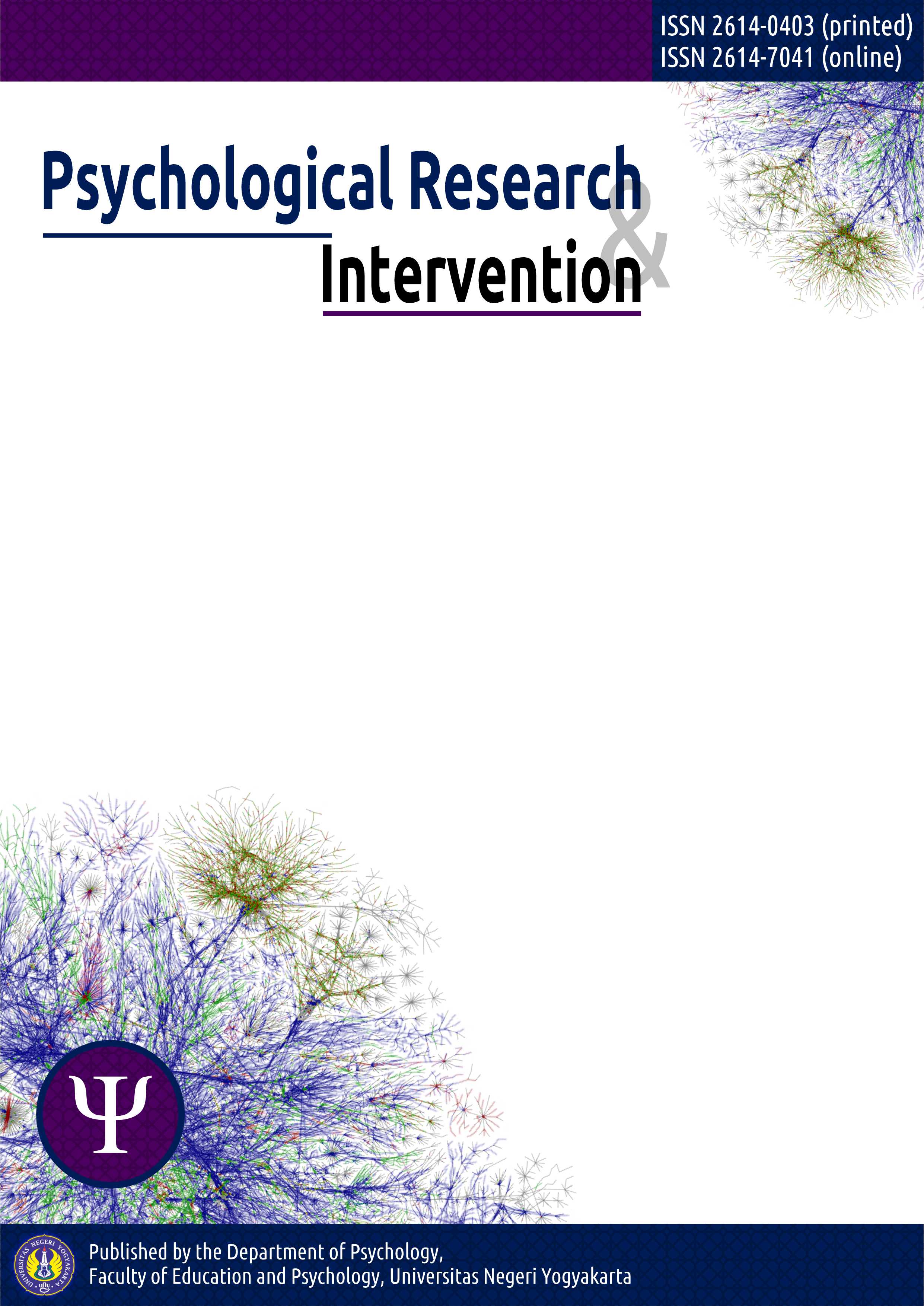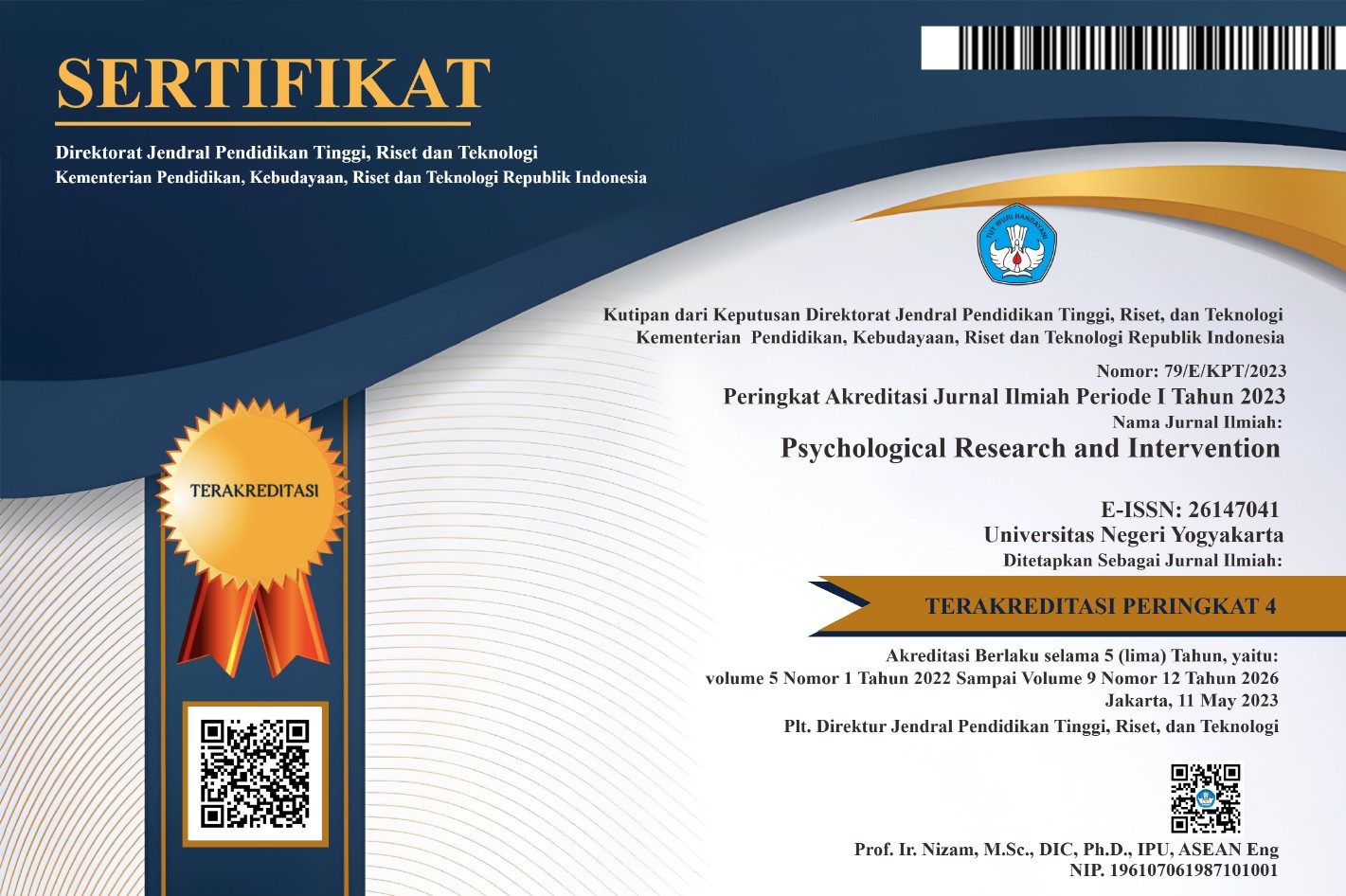The Indonesian version of Individual Work Performance Questionnaire (IWPQ): Structure factor and criterion validity
DOI:
https://doi.org/10.21831/pri.v7i1.76457Keywords:
individual work performance, IWPQ, structure factor, work performanceAbstract
The aims of this study are to examine the structure factor of Indonesian version of Individual Work Performance Questionnaire (IWPQ) and to test the construct of IWPQ by correlating with Utrecht Work Engagement Scale (UWES) as criterion. A total of 609 data from employees across Indonesia were involved in the research (Study 1 = 231, and Study 2 = 378). Data analysis was done using CFA to test the evidence validity based on internal structure and Pearson correlation to examine evidence of validity based on relation to other variables. This study confirmed the three-factor model of IWPQ in study 1 and study 2 with independent samples. The Indonesian version of the IWPQ also correlate positively with work engagement as criterion proving the evidence validity based on relation to others variable. The finding of this research strengthens the Indonesian version of IWPQ as a good tool in measuring work performance
References
Aiken, L. R. (1985). Three coefficients for analyzing the reliability and validity of ratings. Educational and Psychological Measurement, 45(1), 131–142. https://doi.org/10.1177/0013164485451012
Allen, M. J., Yen, W. M., & Allen. M. J., Yen, W. M. (1979). Introduction to measurement theory. United States of America: Brooks Cole Pusblishing.
American Educational Research Association, A. E. R. A., American Psychological Association, A. P. A., & National Council on Measurement in
Education, N. C. on M. in E. (2014). Standards for educational and Psychological testing. American Educational Research Research Association.
Amran, M., Zamralita, Z., & Lie, D. (2022). The impact of job crafting towards performance with work engagement as a mediator among high school teachers in South Tangerang, Indonesia. Proceedings of the 3rd Tarumanagara International Conference on the Applications of Social Sciences and Humanities (TICASH 2021), 655(TICASH 2021), 1651–1656. https://doi.org/10.2991/assehr.k.220404.267
Anggriani, A. S., & Tiarapuspa. (2023). Faktor-faktor yang mempengaruhi job performance pada perusahaan Freight Forwarder di Jakarta [Factors that affect job performance in Freight Forwarder companies in Jakarta]. Jurnal Ekonomi Trisakti, 3(1), 725–738.
Anissa, A. A., & Soetjiningsih, C. H. (2022). Lingkungan kerja psikososial dan kinerja pegawai non-swasta di masa pandemi Covid-19 [Psychosocial work environment and performance of non-private employees during the Covid-19 pandemic]. Psikostudia : Jurnal Psikologi, 11(3), 406. https://doi.org/10.30872/psikostudia.v11i3.7896
Beaton, D. E., Bombardier, C., Guillemin, F., & Ferraz, M. B. (2000). Guidelines for the process of cross-cultural adaptation of self-report measures. Spine, 25(24), 3186–3191. https://doi.org/10.1097/00007632-200012150-00014
Berry, L. M. (2003). Employee selection. Thomson Wadsworth.
Borman, W. C., Klimoski, R. J., & Ilgen, D. (2003). Stability and change in Industrial and Organizational Psychology. In I. B. Weiner, W. C. Borman, D. R. Ilgen, & R. J. Klimoski (Eds.), Handbook of Psychology vol 12: Industrial and Organizational Psychology (pp. 1–17). John Wiley & Sons, Inc.
Cahyani, I., Rahmawati, & Milwan. (2021). Effect of reward, work environment, and motivation towards performance of the millennial generation in the Central Bureau of Statistics of East Kalimantan Province. Jurnal Organisasi Dan Manajemen, 17(1), 67–77. https://doi.org/10.33830/jom.v17i1.1065.2021
Campbell, J. P., McHenry, J. J., & Wise, L. L. (1990). Modeling job performance in a population of jobs. Personnel Psychology, 43(2), 313–575. https://doi.org/10.1111/j.1744-6570.1990.tb01561.x
Cohen, J. (1988). Statistical power analysis for the behavioral sciences (2nd edition). Lawrence Erlbaum Associates Publishers.
Daderman, A. M., Ingelgard, A., & Koopmans, L. (2019). Cross-cultural adaptation , from Dutch to Swedish language , of the Individual Work Performance Questionnaire. A Journal of Prevention, Assessment, and Rehabilitation, May, 0–39.
Dí¥derman, A. M., Ingelgí¥rd, A., & Koopmans, L. (2020). Cross-cultural adaptation, from Dutch to Swedish language, of the Individual Work Performance Questionnaire. Work, 65(1), 97–109. https://doi.org/10.3233/WOR-193062
Drewes, G., & Runde, B. (2002). Performance Appraisal. In S. Sonnentag (Ed.), Psychological management of individual performance (pp. 137–154). John Wiley & Sons, Ltd.
Dwiliesanti, W. G., & Yudiarso, A. (2022). Rasch Analysis of The Indonesian Version of Individual Work Performance Questionnaire (IWPQ). JP3I (Jurnal Pengukuran Psikologi Dan Pendidikan Indonesia), 11(2), 152–166. https://doi.org/10.15408/jp3i.v11i2.24157
Field, A. (2018). Discovering Statistics using IBM SPSS Statistics 5th Edition. SAGE.
Furr, R. M. (2022). Psychometrics: An introduction (Fourth edition). SAGE.
Gabini, S., & Salessi, S. (2016). Validación de la escala de rendimiento laboral individual en trabajadores argentinos. Revista Evaluar, 16(1). https://doi.org/10.35670/1667-4545.v16.n1.15714
Gregory, R. J. (2015). Psychological testing: history, principles, and applications (Seventh Ed). Pearson. https://doi.org/10.1017/CBO9780511813757
Hair, J. F., Black, W. C., Babin, B. J., & Anderson, R. E. (2019). Multivariate data analysis (Eight). Cengage Learning EMEA. https://doi.org/10.1002/9781119409137.ch4
Hu, L. T., & Bentler, P. M. (1999). Cutoff criteria for fit indexes in covariance structure analysis: Conventional criteria versus new alternatives. Structural Equation Modeling, 6(1), 1–55. https://doi.org/10.1080/10705519909540118
International Testing Commission. (2017). ITC Guidelines for Translating and Adapting Tests (Second Edition). International Journal of Testing, 18(2), 101–134. https://doi.org/10.1080/15305058.2017.1398166
Jankingthong, K., & Rurkkhum, S. (2012). Factors affecting job performance: A review of literature. Silpakorn University Journal of Social Sciences, Humanities, and Arts, 12(2), 115–127. https://doi.org/10.13140/2.1.1140.5763
Kaiser, H. F. (1974). An index of factorial simplicity. Psychometrika, 39(1), 31–36. https://doi.org/10.1007/BF02291575
Koopmans, L. (2014). Measuring individual work performance (Amsterdam). Department of Public and Occupational Health Vrije Universiteit University Medical Center.
Koopmans, L. (2015). Individual Work Performance Questionnaire - Instruction Manual. Amsterdam: TNO Innovation for Life- Vrije Universiteit University Medical Center.
Koopmans, L., Bernaards, C. M., Hildebrandt, V. H., De Vet, H. C. W., & Van Der Beek, A. J. (2014a). Construct validity of the individual work performance questionnaire. Journal of Occupational and Environmental Medicine, 56(3), 331–337. https://doi.org/10.1097/JOM.0000000000000113
Koopmans, L., Bernaards, C. M., Hildebrandt, V. H., De Vet, H. C. W., & Van Der Beek, A. J. (2014b). Measuring individual work performance: Identifying and selecting indicators. Work, 48(2), 229–238. https://doi.org/10.3233/WOR-131659
Koopmans, L., Bernaards, C. M., Hildebrandt, V. H., Lerner, D., De Vet, H. C. W., & Van Der Beek, A. J. (2016). Cross-cultural adaptation of the Individual Work Performance Questionnaire. Work, 53(3), 609–619. https://doi.org/10.3233/WOR-152237
Koopmans, L., Bernaards, C. M., Hildebrandt, V. H., Schaufeli, W. B., De Vet Henrica, C. W., & Van Der Beek, A. J. (2011). Conceptual frameworks of individual work performance: A systematic review. Journal of Occupational and Environmental Medicine, 53(8), 856–866. https://doi.org/10.1097/JOM.0b013e318226a763
Mardianah, L., Hidayat, S., & Hamidah. (2020). Empirical study of the impact of work from home (WFH) policy and top management support on employee performance. Journal of Research in Business, Economics, and Education, 2(5), 1039–1045. http://e-journal.stie-kusumanegara.ac.id
Markos, S., & Sridevi, M. S. (2010). Employee engagement: The key to improving performance. International Journal of Business and Management, 5(12), 89. https://doi.org/E-ISSN 1833-8119
Miller, L. A., & Lovler, R. L. (2020). Foundation of psychological testing: A practical approach. In Sage (Sixth Edit).
Murphy, K. R., & Davidshofer, C. O. (2005). Psychological testing: principles and application (Sixth). Pearson Education International.
Prowse, P., & Prowse, J. (2010). The dilemma of performance appraisal. Business Performance Measurement and Management: New Contexts, Themes and Challenges, 13(4), 195–206. https://doi.org/10.1007/978-3-642-04800-5_13
Ramos-Villagrasa, P. J., Barrada, J., Fernández-del-Río, E., & Koopmans, L. (2019). Assessing job performance using brief self-report scales : The case of Individual WOrk Performance Questionnaire. Journal of Work and Organizational Psychology, 35(3), 195–205. https://journals.copmadrid.org/jwop/art/jwop2019a21
Ramos-Villagrasa, P. J., Barrada, J. R., Fernandez-del-Rio, E., & Koopmans, L. (2019). Assessing job performance using brief self-report scales : The case of Individual WOrk Performance Questionnaire. Journal of Work and Organizational Psychology, 35(3), 195–205.
Rich, B. L., Lepine, J. A., & Crawford, E. R. (2010). Job engagement: Antecedents and effects on job performance. Academy of Management Journal, 53(3), 617–635. https://doi.org/10.5465/amj.2010.51468988
Rosenthal, J. A. (1996). Qualitative descriptors of strength of association and effect size. Journal of Social Service Research, 21(4), 37–41. https://doi.org/10.1300/J079v21n04
Santalla-Banderali, Z., & Alvarado, J. M. (2022). Factorial structure of Individual Work Performance Questionnaire (Version 1.0) revisited: Evaluation of acquiescence bias. PLoS ONE, 17(7 July), 6–9. https://doi.org/10.1371/journal.pone.0271830
Schaufeli, W. B., & Bakker, A. B. (2004). Manual Utrecht Work Engagement Scale. Occupational Health Psychology Unit Utrecht University, December, 1–60. https://doi.org/10.1037/t01350-000
Sonnentag, S., & Frese, M. (2002). Performance: Concept, theory, and predictors. In S. Sonnentag (Ed.), Psychological management of individual performance (pp. 3–26). John Wiley & Sons, Ltd.
Sutarto, A. P., Izzah, N., & Farda, Z. (2022). Evaluasi prevalensi keluhan otot rangka dan tingkat produktivitas subyektif pada karyawan marketing online [Evaluation of the prevalence of skeletal muscle complaints and subjective productivity levels in online marketing employees]. Jurnal INTECH Teknik Industri Universitas Serang Raya, 8(2), 149–160. https://doi.org/10.30656/intech.v8i2.5011
Sutarto, A. P., Wardaningsih, S., & Putri, W. H. (2022). Factors and challenges influencing work-related outcomes ofthe enforced work from home during the COVID-19 pandemic: Preliminary evidence from Indonesia. Global Business and Organizational Excellence, 41(5), 14–28. https://doi.org/https://doi.org/10.1002/joe.22157
van der Vaart, L. (2021). The performance measurement conundrum: Construct validity of the individual work performance questionnaire in South Africa. South African Journal of Economic and Management Sciences, 24(1), 1–11. https://doi.org/10.4102/sajems.v24i1.3581
Viswesvaran, C., & Ones, D. S. (2000). Perspectives on models of job performance. International Journal of Selection and Assessment, 8(4), 216–226. https://doi.org/10.1111/1468-2389.00151
Widyastuti, T., & Hidayat, R. (2018). Adaptation of Individual Work Performance Questionnaire (IWPQ) into bahasa Indonesia. International Journal of Research Studies in Psychology, 7(2). https://doi.org/10.5861/ijrsp.2018.3020
Wijayanti, I. (2016). Work engagement ditinjau dari job demands dan job characteristic dengan quality of work life sebagai mediator [Work engagement viewed from job demands, job quality characteristic, and quality of work life as mediator]. Universitas Gadjah Mada.
Wild, D., Grove, A., Martin, M., Eremenco, S., McElroy, S., Verjee-Lorenz, A., & Erikson, P. (2005). Principles of good practice for the translation and cultural adaptation process for patient-reported outcomes (PRO) measures: Report of the ISPOR Task Force for Translation and Cultural Adaptation. Value in Health, 8(2), 94–104. https://doi.org/10.1111/j.1524-4733.2005.04054.x
Wulandari, W., Hermanu, D. H., & Bernarto, I. (2020). Pengaruh Gaya Kepemimpinan dan Optimisme Karyawan Terhadap Employee Performance [The Effect of Leadership Style and Employee Optimism on Employee Performance]. JIMEA (Jurnal Ilmiah MEA (Manajemen, Ekonomi, Dan Akuntansi), 4(3), 1685–1710.
Yuniardi, M. S., Cant, M., Putri, A., Amalia, A. N., & Arumbiya, S. (2023). Intolerance of uncertainty predicting work performance of indonesian temporary employees mediated by personal initiative. Jurnal Ilmiah Psikologi Terapan, 11(1), 25–30. https://doi.org/10.22219/jipt.v11i1.23079












